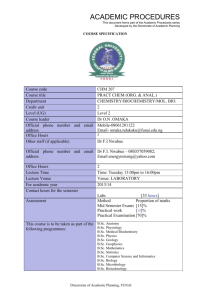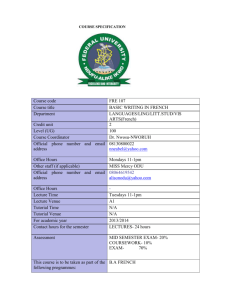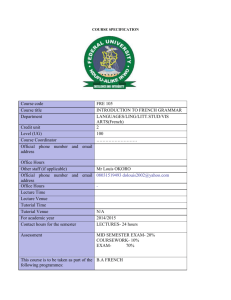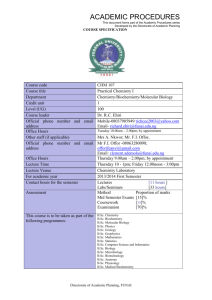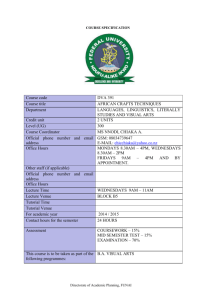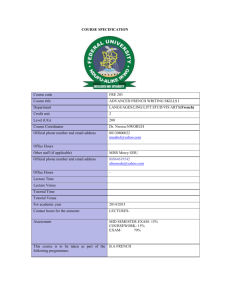View/Open
advertisement
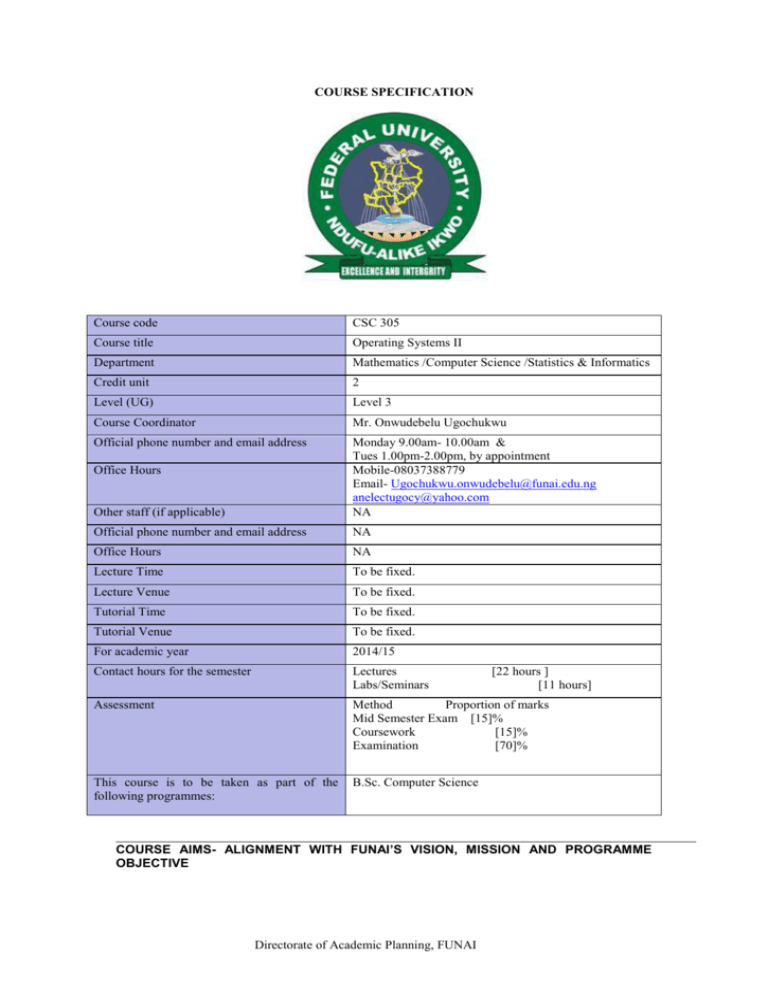
COURSE SPECIFICATION Course code CSC 305 Course title Operating Systems II Department Mathematics /Computer Science /Statistics & Informatics Credit unit 2 Level (UG) Level 3 Course Coordinator Mr. Onwudebelu Ugochukwu Official phone number and email address Other staff (if applicable) Monday 9.00am- 10.00am & Tues 1.00pm-2.00pm, by appointment Mobile-08037388779 Email- Ugochukwu.onwudebelu@funai.edu.ng anelectugocy@yahoo.com NA Official phone number and email address NA Office Hours NA Lecture Time To be fixed. Lecture Venue To be fixed. Tutorial Time To be fixed. Tutorial Venue To be fixed. For academic year 2014/15 Contact hours for the semester Lectures Labs/Seminars Assessment Method Proportion of marks Mid Semester Exam [15]% Coursework [15]% Examination [70]% This course is to be taken as part of the following programmes: B.Sc. Computer Science Office Hours [22 hours ] [11 hours] COURSE AIMS- ALIGNMENT WITH FUNAI’S VISION, MISSION AND PROGRAMME OBJECTIVE Directorate of Academic Planning, FUNAI After completing the course, the student should be able to identify the interfaces of an operating system. Specifically, the course is aimed at the following: i. ii. iii. iv. v. Focuses on different types of operating systems (time-sharing, real time, etc.), on their fundamental concepts (processes and communication mechanisms), the functionality of their components (subsystems for process, memory management). To understand program loading and placement in systems with one or several programs in memory. To understand context switching, multi-programmed and multithreaded systems. To understand scheduling of processes and basic scheduling policies. This course will further expose students to another important concept in process synchronization which is mutual exclusion. INTENDED LEARNING OUTCOMES Having completed this course the student is expected to: i. Be able to explain various terms such as threads and concurrency use in operating system. ii. Be able to explain the concept context switching, interrupts, concurrent execution etc. iii. Justify the presence of concurrency within the framework of an operating system. iv. Describe how the resources of the computer system are managed by software. v. Differentiate between the concept of processes and threads of control. vi. Classify scheduling policies with examples from different operating systems vii. Be to describe how mutual exclusion can be implemented by hardware or software. viii. Be able to define deadlock as well as state the necessary conditions for deadlock to occur LEARNING AND TEACHING METHODS The course will be delivered through a combination of lectures, seminars, tutorials and workshops that will feature student centred activities including computer-aided materials and workbooks. INDICATIVE CONTENT Lecture/seminar programme FUNAI WEEK 5 6 Topic/Reading for private study Threads and Concurrency: States & State diagrams Structures, Dispatching Context Switching, Interrupts; Concurrent execution 7 Mutual exclusion 8 Problem and some solutions Deadlock Tasks/Think points for private study Lecturer should explain the meaning of threads, processes, concurrent programming Lecturer should explain Switching among multiple processes, Switch From Process to Process, interrupts, Lecturer Lecturer should describe mutual exclusion and ways to enforce mutual exclusion. Lecturer should explain Deadlock Characterization as well as methods for Dealing with Deadlocks Mr. Onwudebelu, U Mr. Onwudebelu, U Mr. Onwudebelu, U Mr. Onwudebelu, U Directorate of Academic Planning, Federal University Ndufu-Alike, Ikwo (FUNAI) 2 9 Multithreading mechanisms monitors etc.) 10 Mid –Semester Test 11 Producer Problems 12 13 14 18 19 20 21 22 23 Models and (Semaphores, – Lecturer should explain multithreading Models and their various types such as Many-to-One, One-to-One and Many-to-Many. He is to explain the differences between a monitor and a semaphore Mr. Onwudebelu, U Mid–Semester Test Mr. Onwudebelu, U Consumer Lecturer should explain producer consumer problems with an example of the pipelined model, the sleeping barber problem Lecturer should explain Synchronization synchronization hardware, Classic Problems of synchronization, synchronization with examples in Solaris, Windows XP, Linux etc. He Lecturer is to explain Multiprocessor issues multiprocessor systems, explain new problems in multiprocessor: multiprocessor synchronization and multiprocessor scheduling Lecturer is to explain CPU Scheduling and Dispatching scheduling decisions that may take place when there is a process as well as scheduling criteria. He should explain dispatcher module, Dispatch latency is to explain Memory Management: Lecturer overlays, swapping and Overlays, Swapping partitions as pertain to and Partitions. memory management. Paging, Segmentations, Lecturer should explain Placement and replacement paging, segmentations, policies. placement and replacement policies. Working sets, Thrashing, Lecturer should discuss on Caching etc. working sets, thrashing, caching etc. In class Revision Exams Exams Mr. Onwudebelu, U Mr. Onwudebelu, U Mr. Onwudebelu, U Mr. Onwudebelu, U Mr. Onwudebelu, U Mr. Onwudebelu, U Mr. Onwudebelu, U Mr. Onwudebelu, U Mr. Onwudebelu, U Mr. Onwudebelu, U INDICATIVE KEY LEARNING RESOURCES Core reading list This course is in part based around notions and/or material that can be found in the core text(s) listed below. It is therefore likely that you will use, or refer to, in your lecture/seminar sessions the notions Directorate of Academic Planning, Federal University Ndufu-Alike, Ikwo (FUNAI) 3 and/or material in the books listed here. You will likely be directed to study aspects of these texts in your out-of-classroom time, that is, in your private study. Siblerschatz and Galvin, Operating System Concepts, 6th Ed. 2001 Addison Wesley, Inc.. Supplementary reading Flynn I.M. & McIver McHoes A. (2010), Understanding Operating Systems, 6th ed., Course Technology John English, 2005, Introduction to Operating Systems: Behind the Desktop, Palgrave McMillian. D.M. Dhamdhere, 2007, Operating Systems: A Concept based Approach, McGraw Hill. William Stallings, 2009, Operating Systems: Internals and Design Principles, Prentice Hall. CONTINIOUS ASSESSMENT The Intended Learning Outcomes are assessed through: Assessment Mid semester Examination Coursework (Assignment) End of Semester Examination Weight 15% 15% 70% Deliverables - important dates Ensure that you make a careful note of when the assessment tasks are due in for this course. Try not to leave working on these tasks until the last minute – this is stressful for you and tends to lead to poor quality work. Remember that you have several assessments (for different courses) due the same week and you will need to plan for this. Assessment Mid Semester ExamTo be held at the regular class time and venue Coursework Semester Exam Due date FUNAI WEEK 10 Feedback & Result 14 working days after the assessment FUNAI WEEK 22-23 14 working days after the assessment Feedback on your work The university is committed to providing you with written feedback for all assessed coursework within 14 working days from the submission date. You will get feedback on your performance on a feedback form which will be returned to you. If you do not receive feedback within this time, then you should first contact the course leader. If it proves necessary, you should then contact the Head of Department. Submitted coursework, including your final year project, will not be returned to you. This is true for all coursework, in all courses and at all levels, and does not apply to only this course. We must keep the original copy of all coursework to provide the external examiners with a complete record of your work. Directorate of Academic Planning, Federal University Ndufu-Alike, Ikwo (FUNAI) 4 Late coursework It is the University policy to accept and grade all late items of coursework (up to the published latest date for submission). There is no such thing as 'an extension'. You cannot negotiate new deadlines, and you do not need to get agreement about handing in your work late from the course leader or any other member of staff. Late coursework submissions are, however, subject to penalties (capping) that determine the maximum grade that you can achieve depending upon how late the work is. The current penalty scale can be found below: The following caps to be uniformly applied, in the absence of relevant mitigating circumstances accepted by the BoE: Up to 1 working day late Up to 2 working days late Up to 5 working days late Up to 10 working days late Up to 15 working days late More than 15 working days late Mark capped at 90% Mark capped at 80%; Mark capped at 70%; Mark capped at 60%; Mark capped at 50%; Mark capped at 0%. A working day is here defined as Monday to Friday at any time of year, with the exception of Nigeria national holidays. Students with mitigating circumstances can apply to have penalties removed via submission of the appropriate form and evidence within 7 days of the submission deadline. How to do this can be found in the University Assessment Policy and Procedure. Planning your time i. Students are expected to attend all classes including seminars and laboratory sessions for each course. It is mandatory for students to have a minimum attendance of 75% in this course to be eligible to take the final semester examination. ii. Note: Instructors are not required to provide mid semester test make-up. Directorate of Academic Planning, Federal University Ndufu-Alike, Ikwo (FUNAI) 5


